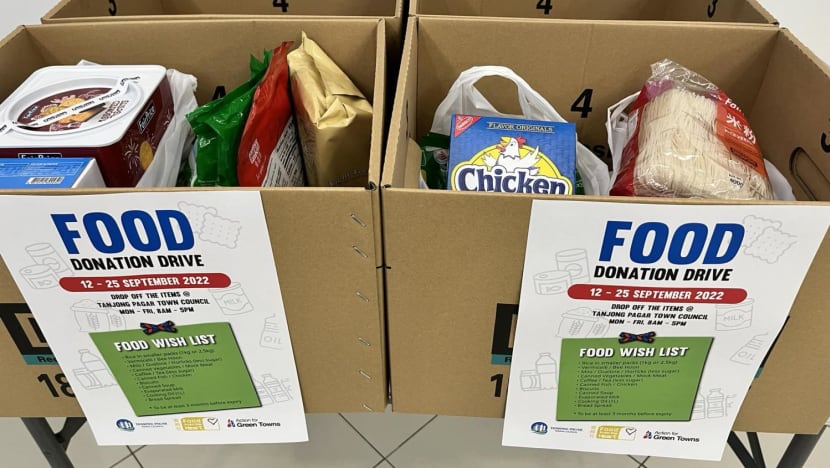Food charities in Singapore provide healthier alternatives even as donations drop
The charities have also been striving to reduce food waste.

A food donation drive for non-perishable items by food charity Food from the Heart. The number of donations to such charities has dropped. (Photo: Facebook/Food from the Heart)
SINGAPORE: Food charities in Singapore have been receiving fewer donations this year, leading to groups reaching into their own pockets to continue funding beneficiaries while helping them to maintain a healthy level of nutrition.
Donations to Food from the Heart have dropped by about 10 per cent to 15 per cent from last year, said the charity’s chief executive Robin Lee, citing the improvement in the COVID-19 situation and inflation as possible reasons.
“During COVID times people did not travel. There are not many things to do, there was maybe a little bit to spare (for people) to donate more,” he said.
Corporate funding that may have been diverted from arts and sporting organisations to groups like his during the pandemic is also starting to decrease, Mr Lee added.
He noted that inflation has also meant higher food prices.
“The price of food has gone up a lot (so) they (donors) might have other obligations for the expenses,” he said.
Food from the Heart gave out about 47,000 packs filled with rations to the needy in 2019. This year, it is on track to distribute about 140,000, a three-fold increase.
The charity has to supplement its supply of food, he said, adding that it has been organising food drives for the past three months.
“It was quite successful. Singaporeans are really stepping up and coming out to help us,” he said.
Supporters and sponsors - food manufacturers, distributors and wholesalers - have also increased their prices only slightly so the charity does not have to fork out too much more, he said.
MOVING TOWARDS HEALTHIER FOOD
Another charity, The Food Bank Singapore, has also received fewer donations. Its founder Nichol Ng said donations “exploded” in 2020, but there has been some “donor fatigue” this year.
Compared to both 2020 and last year, there has been a drop of 30 per cent to 40 per cent in cash donations, she said. The number of bulk food donations has also fallen. Her charity helps about 30,000 people a year.
But while the quantity of donations is declining, the quality is going up.
Both charities have been including healthier items in their food packs, and donors are also contributing more of such wholesome food.
For instance, The Food Bank Singapore swapped its regular rice vermicelli for brown rice.
Every food bundle has a balance of carbohydrates, vegetables, and proteins, Ms Ng said.
“The other change that we also did, I think, along with many other charity organisations, is the inclusion of fresh food products inside, so vegetables and from time to time sometimes by the request of donors, possibly fresh protein as well,” she said.
Food from the Heart includes brown rice and red vermicelli instead of white rice and white vermicelli.
However, this does not mean that everything in a food bundle must be healthy all the time.
“It's okay to indulge from time to time ... so we do still accept some of the nicer sweets or chocolate or potato chips,” said Ms Ng.
Mr Lee said that his organisation does not get too many unhealthy food items in donations, as people can distinguish between healthy and unhealthy food.
HEALTHY DOES NOT MEAN EXPENSIVE
While there is a perception that healthier food tends to be more expensive, this is not necessarily the case, said dietician Jaclyn Reutens.
A meal that includes white or brown rice, tofu, egg and one or two vegetables, is well-balanced, said Ms Reutens, who founded Aptima Nutrition and Sports Consultants.
“You don't need to have brown rice and your salmon or your cod fish, with the broccoli and your capsicum to make it a very well-balanced meal,” she said.
Canned food, while preserved in salt water, can also be part of a healthy well-balanced diet, she added.
While certain processed food like nuggets, cookies and sausages are unhealthier than, for instance, canned corn, these can still be consumed, depending on frequency and quantity.
“I think people really need to redefine what healthy eating means,” said Ms Reutens. For example, just because you are unable to afford organic food does not mean you are doing a disservice to your family, she added.
PREVENTING FOOD WASTE
Both Food from the Heart and The Food Bank Singapore have been striving to prevent food waste.
Mr Lee said his charity avoids overserving by working closely with community partners.
When it comes to school goodie bags, if there are two eligible siblings in the same school, they make sure they give it to only one sibling. One such bag of 15 items is expected to be good for a family of four for a month.
The charity also collects cans of food that are slightly dented and nearer to their expiry date, which would have otherwise gone to waste.
Food that is too near expiry to be included in food packs is shared with other charities such as Willing Hearts and The Hiding Place, which serve cooked food, said Mr Lee.
His organisation is also able to make better purchases based on analytics done by OCBC Bank that show what people consume and how much.
Ms Ng said her organisation takes note of when a beneficiary appears to have stock of a certain food, and may not give them more of the same item.
Instead of giving out food bundles, her charity is working on letting beneficiaries shop at the supermarket or wet market themselves to pick what they want.
“Because the other part of the waste actually comes from food that's distributed, but people don't want to eat or they don't consume it,” she said.
“We must remember that every donor’s dollar right now is really very precious, not a single dollar or a single packet of food should actually be wasted.”


















